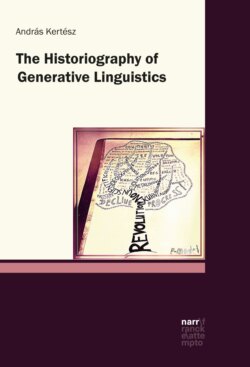Читать книгу The Historiography of Generative Linguistics - András Kertész - Страница 36
На сайте Литреса книга снята с продажи.
2.5.2.2 Unscientific revolution
ОглавлениеWe mentioned in Section 2.4.1 that the work of LappinLappin, Shalom, LevineLevine, Robert D. and JohnsonJohnson, David D. – whose ironical title, The Structure of Unscientific Revolutions, intended to paraphrase the title of KuhnKuhn, Thomas S.’s book – created a heated debate by arguing for the following thesis:
| (T22) | (a) | Although the development of generative linguistics including the Theory of Government and BindingGovernment and Binding, Theory of can rightly be called revolutionary,revolutionary minimalismminimalism is a step backwards. |
| (b) | The retention of the Minimalist ProgramMinimalist Program is motivated exclusively by the authoritative organization of the generative community, and not by its scientificscientific significance. |
When arguing for (T22)(a), LappinLappin, Shalom et al. (2000a,b, 2001), emphasize in different ways that they are in agreement with the claim according to which generative linguistics has been revolutionaryrevolutionary since the end of the 1950s, culminating in Government-BindingGovernment and Binding, Theory of Theory. However, they cannot provide a rational explanation for the circumstance that the progression of this revolutionary change came to halt as a result of the uncritical acceptance of minimalismminimalism. The authors analyze the main categories of minimalism, which we listed in the first point in Section 2.5.0 – above all, the term ›perfectionperfection‹ –, and they draw the conclusion that minimalism is built upon the vague metaphor of ›perfectness‹ instead of a firm empirical basis (Lappin et al. 2000a: 666). Contrary to the second point in 2.5.0, they demonstrate that it is precisely those categories which were excluded from the technical apparatus of minimalism that made the Theory of Principles and ParametersPrinciples and Parameters, Theory of so well-known and successful worldwide (Lappin et al. 2000a: 668–9).
In connection with the third point in Section 2.5.0, they consider UriagerekaUriagereka, Juan (1998) to be the propagandistic defense of minimalismminimalism and take it as an example to demonstrate that minimalism »does not manage to specify even a remotely credible connection between the concepts and methodologymethodology of the MP [the Minimalist ProgramMinimalist Program] and those of the natural sciencesciencenaturals« (LappinLappin, Shalom et al. 2000a: 667–668; emphasis added; see also LevineLevine, Robert D. 2002). Opposing the fourth point, they believe that minimalism is by no stretch of the imagination an implementation of the ideal of GalileanGalilean science. Instead, they argue that »this groundless aura of scientismscientism is used to promote the view that minimalist theorytheory has brought the study of syntax to a level of precision and empirical coverage comparable to that of chemistry and physicsphysics« (Lappin et al. 2000a: 667; emphasis added). Finally, the fact that minimalism is referred to as ›only‹ a program (see the fifth point in Section 2.5.0), from which one cannot expect results as maturemature and rigorous as from a theory, attempts to turn a shortcoming into a virtue. Namely, the authors express their doubts regarding the statement that minimalism is not a theory, but only a program, since the transition to the Minimalist Program from the Theory of Government and BindingGovernment and Binding, Theory of involves a significant theoretical change (Lappin et al.: 2000b: 902).
Concerning (T22)(b), the authors find it »mystical« that the group of generativists that had previously been enthusiastic about the Theory of Government and BindingGovernment and Binding, Theory of and applied it successfully, gave it up overnight and stood up for a less maturemature program that lacked a firm methodological and empirical foundation and had not resulted in new scientificscientific insights. They find it difficult to understand that »large numbers of researchers should substitute one theorytheory for another simply on the basis of ChomskyChomsky, Noam’s personal authorityauthority, without subjecting his assumptions to the sort of critical evaluation that they would normally apply to theoretical innovations proposed under different authorship« (LappinLappin, Shalom et al. 2000a: 669; emphasis added).
Thus, in the authors’ view, rational argumentation is of a minor significance in generative linguistics (LappinLappin, Shalom et al., 2000a: 670), and the solution of the ›mystery‹ is, as the last quotation shows, authorityauthority and group membership.1
As their final conclusion, the authors question whether the Minimalist ProgramMinimalist Program is scientificscientific at all (cf. LappinLappin, Shalom et al. 2000a: 670, 2000b: 878, 2001: 916), saying: »We know of no serious scientific discipline where theoretical paradigmsparadigm are granted large scale acceptance in such a cavalier and uncritical manner« (Lappin et al., 2000a, p. 670).2 This conclusion is even sharper than SeurenSeuren, Pieter A.M.’s: while Seuren characterizes minimalismminimalism as spurious sciencesciencespurious, Lappin et al. suggest that it is not even a science, but, as the title of their target article suggests, the result of an »unscientific revolutionrevolutionunscientific«.
The authors do not define their historiographicalhistoriography framework, but it obviously follows from the paraphrase of the title of KuhnKuhn, Thomas S.’s book and the use of KuhnianKuhnian terminology (›paradigmparadigm‹, ›paradigm shift‹) that they consider the Kuhnian approach to the historyhistory of science as their historiographical point of departure.
LappinLappin, Shalom, LevineLevine, Robert D. and JohnsonJohnson, David D.’s article was followed by a debate in the same journal, in which the arguments for and against minimalismminimalism, and parallel to this, the opinions on the revolutionaryrevolutionary nature of minimalism versus that of the Theory of Government and BindingGovernment and Binding, Theory of polarized.3
LappinLappin, Shalom et al.’s solution for (P) can be reconstructed as follows:
| (SP22) | The basic term of the historiographyhistoriography of generative linguistics with respect to the Minimalist ProgramMinimalist Program is ›authority‹authority and ›unscientific‹, its central hypothesis is (T22) and its historiographical framework is KuhnKuhn, Thomas S. (1970) [1962]. |
